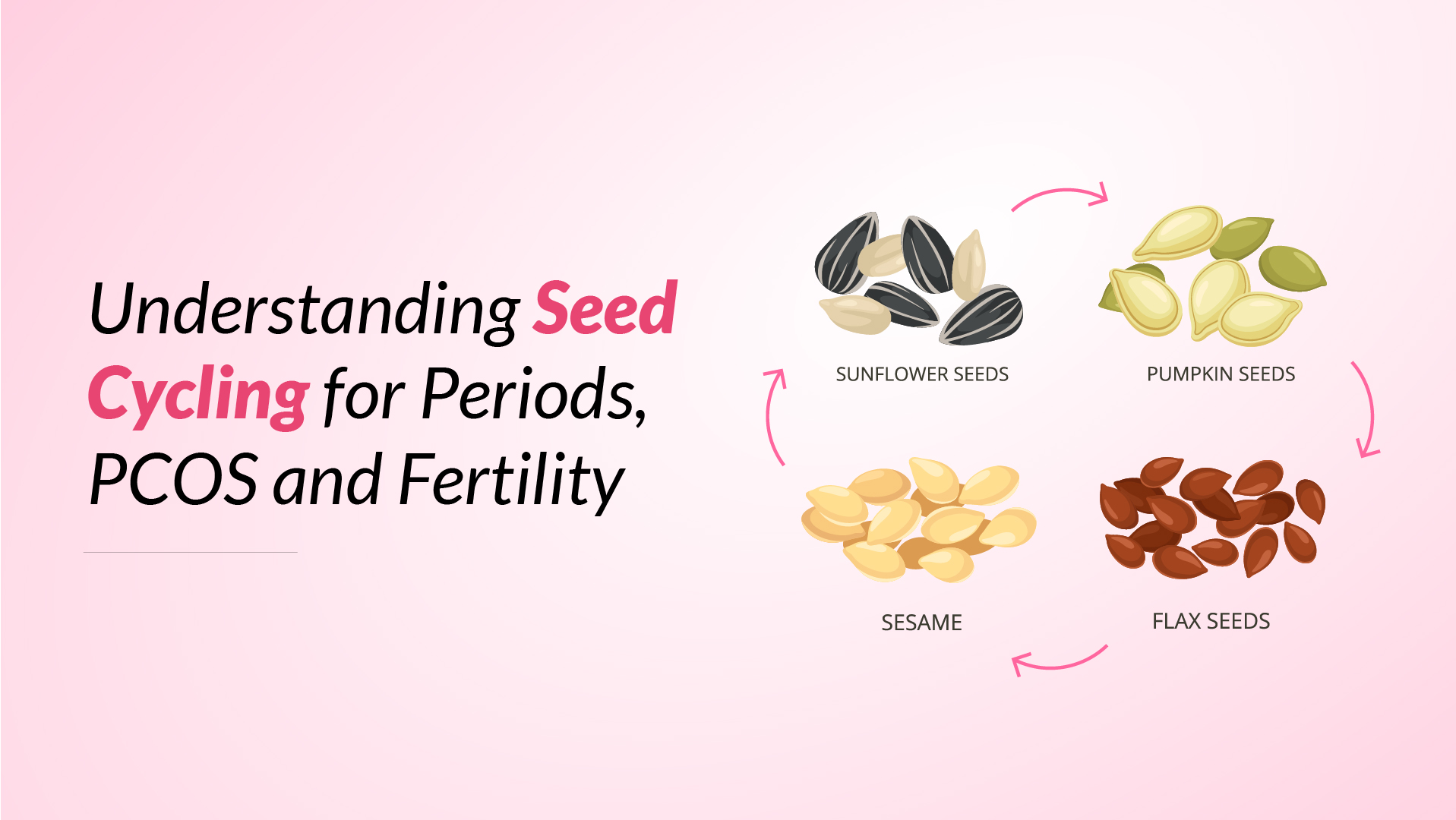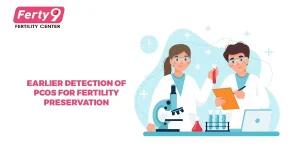In a world where people are searching for holistic health and natural remedies, seed cycling has gained immense admiration as a potential solution for addressing various menstrual and hormonal imbalances. This age-old practice involves consuming specific seeds during different phases of the menstrual cycle, aiming to support hormonal balance, regulate periods, alleviate symptoms of Polycystic Ovary Syndrome (PCOS), and enhance fertility. As we delve deeper into this intriguing approach, let’s explore the science behind seed cycling and its potential benefits.
What is Seed Cycling & How Does it Work?
Seed cycling is a natural method that leverages the power of nutrient-dense seeds to support the body’s hormonal fluctuations throughout the menstrual cycle. It involves consuming specific seeds during the two distinct phases of the menstrual cycle.Considering most regular cycles to be 28-30 days in duration,
- Follicular phase-first 14-16 days (from the first day of menstrual cycle to ovulation)
- Luteal phase- last 14 days (from ovulation day to the start of the next period)
The rationale behind seed cycling lies in the unique nutritional profiles of the seeds chosen for each phase. During the follicular phase, the focus is on supporting oestrogen production which is an essential hormone preparing the endometrium of uterus, while the luteal phase aims to promote progesterone levels which is needed for making essential changes in the endometrium for the embryo to implant.
Also read: Menstrual Cycle and Fertility
Seed Cycling Benefits
Seed cycling offers a multitude of potential benefits for women’s reproductive health and overall well-being. Here are some of the key advantages associated with this practice:
- Regulating Menstrual Cycles: By supporting hormonal balance, seed cycling may help regulate irregular periods, alleviating the frustration and discomfort associated with menstrual irregularities.
- Alleviating PCOS Symptoms: For women with Polycystic Ovary Syndrome (PCOS), seed cycling may help manage symptoms such as irregular periods, excess hair growth, and weight management challenges.
- Enhancing Fertility: By optimising hormonal levels and promoting a healthy uterine environment, seed cycling may increase the success rates of women trying to conceive.
- Reducing Menstrual Discomfort: The anti-inflammatory properties of certain seeds may help alleviate menstrual cramps, bloating, and other discomforts associated with the menstrual cycle.
- Supporting Overall Hormonal Balance: Seed cycling may help maintain hormonal equilibrium, positively impacting various aspects of a woman’s health, including mood, energy levels, and skin health.
Also read: The Role Of Hormonal Imbalances In Female Infertility
How Seed Cycling Supports Regular Periods
Achieving regular periods is a common goal for many women, and seed cycling may offer a natural approach to support this endeavour. Here’s how seed cycling may contribute to regulating menstrual cycles:
Balancing Hormones Through Nutrient-rich Seeds
The seeds used in seed cycling are full of nutrients that play crucial roles in hormonal regulation. By providing the body with these essential nutrients, seed cycling may help maintain a balanced hormonal environment, which is vital for regular menstrual cycles.
Rich Source of Essential Fatty Acids
Seeds like flaxseeds, pumpkin seeds & sesame seeds have copious quantities of essential fatty acids, such as omega-3 and omega-6. These fatty acids are crucial for hormone production and regulation, and their adequate intake may help support regular ovulation and menstrual cycles.
Lignan Content in Seeds
Lignans are plant compouds found in seeds like flaxseeds and sesame seeds. These compounds may help regulate oestrogen levels, which can be beneficial for women with conditions like PCOS or oestrogen dominance, both of which can contribute to irregular periods.
Providing Micronutrients for Hormonal Health
Seeds are rich in various micronutrients, including zinc, magnesium, and vitamin E, which play essential roles in hormone production, regulation, reproductive and general health.
Supporting Detoxification
Certain seeds, like flaxseeds and pumpkin seeds, contain a good quantity of fibre and antioxidants, which may aid in removing toxins from the body and improve the egg health.
Improving Menstrual Symptoms
In addition to promoting regular periods, seed cycling may also help alleviate common menstrual symptoms such as cramps, bloating, and mood swings. The anti-inflammatory properties of seeds like flaxseeds and pumpkin seeds, as well as their rich nutrient profiles, may contribute to reducing these discomforts.
How Much of Each Seed to Consume During the Menstrual Cycle
To reap the complete benefits of seed cycling, following the recommended seed intake during the menstrual cycle is essential. Here’s a general guideline:
Follicular Phase (Day 1 to 14):
- Flaxseeds: 1-2 tablespoons per day
- Pumpkin Seeds: 1-2 tablespoons per day
Rich in lignans and omega-3 fatty acids, these seeds may help support oestrogen production and promote a healthy follicular phase.
Luteal Phase (Day 15 to 28):
- Sesame Seeds: 1-2 tablespoons per day
- Sunflower Seeds: 1-2 tablespoons per day
These seeds have immense amounts of zinc, vitamin E & omega-6 fatty acids. These support progesterone production and maintain a healthy luteal phase.
How Seed Cycling Can Help with PCOS
A hormonal disorder, Polycystic Ovary Syndrome (PCOS), affects many adolescent girls,women of reproductive age. Seed cycling may offer potential benefits for managing PCOS symptoms and supporting overall health. Here’s how seed cycling can help with PCOS:
Boosting Fertility
For women with PCOS trying to conceive, seed cycling may help improve fertility by regulating hormonal imbalances. The nutrients found in seeds, such as lignans and essential fatty acids, may create a more favourable environment for conception.
Promoting Healthy Digestion
Digestive issues are often associated with PCOS, and the fibre content in seeds may help promote regular bowel movements & support overall digestive health. This can be beneficial for managing symptoms like bloating and constipation.
Supporting Regular Menstrual Cycles
One of the primary challenges faced by women with PCOS is irregular or absent periods. By supporting hormonal balance through seed cycling, women may experience more regular menstrual cycles, which can be crucial for fertility and overall reproductive health.
Anti-inflammatory Benefits
Chronic inflammation is a common manifestation of PCOS, and it can contribute to various symptoms and complications. The anti-inflammatory properties of seeds like flaxseeds and pumpkin seeds alleviate PCOS-related symptoms.
Related read: Why Are Women Worried About Female Fertility Too Early?
How Seed Cycling Can Help with Fertility
For couples trying to conceive, seed cycling may offer a natural approach to support fertility. Here’s how seed cycling can contribute to enhancing fertility:
Hormonal Balance supporting fertility
Seed cycling promotes a healthy hormonal environment which may help in enhancing fertility.
Promoting a Fertility-friendly Uterine Environment
The nutrients found in seeds, such as omega-3 fatty acids and lignans, may help create a favourable uterine environment for implantation and embryo development. This can increase the likelihood of a successful pregnancy.
Supporting a Healthy Luteal Phase
The luteal phase, which occurs after ovulation, is crucial for establishing and maintaining a pregnancy. Seed cycling during this phase may help support progesterone levels. Progesterone hormone is necessary for a healthy luteal phase and early pregnancy development.
Enhancing Egg Quality
The quality of a woman’s eggs plays a significant role in fertility and the chances of a successful pregnancy. The antioxidants and vitamins present in seeds may help protect eggs from oxidative stress and support the production of high-quality eggs.
Reducing Inflammation
Chronic inflammation can negatively impact fertility by disrupting hormonal balance and creating an unfavourable environment for conception and implantation. The anti-inflammatory properties of seeds like flaxseeds and pumpkin seeds may help reduce inflammation & improve fertility.
Improving Sperm-friendly Cervical Mucus
Cervical mucus can play an elementary role in facilitating the sperm movement towards the egg. The favourable hormonal environment created by seed cycling aids in cervical mucus changes that are needed for a successful pregnancy natural pregnancy.
Who Should Avoid Seed Cycling?
While seed cycling is generally considered safe for most women, there are certain situations where it may not be recommended or should be approached with caution:
- Hormonal Imbalances or Conditions: Women with hormonal imbalances or conditions like oestrogen dominance, endometriosis, or uterine fibroids should consult with a gynaecologist before starting seed cycling, as it may impact their specific conditions.
- Thyroid Disorders: These patients should consult a doctor before incorporating these seeds into their diet.
- Nut or Seed Allergies: If you have a known allergy or sensitivity to any seeds used in seed cycling, it’s best to avoid them.
- Pregnancy or Breastfeeding: Seed cycling is generally considered safe during pregnancy & breastfeeding. Consult with your doctor before making any significant dietary changes during these times.
- Existing medical conditions like Hypertension, diabetes,abnormal lipid metabolism, previous MI or stroke etc should be cautious before starting seed cycling and do so only with physician consultation.
- Any known causes of hormonal imbalance to be corrected medically alongside seed cycling for better benefits.
Find Hope and Solutions for Female Infertility and Male Infertility — Explore Our Comprehensive Services
IVF Treatment
IUI Treatment
ICSI Treatment
PICSI Treatment
Fertility Preservation Service
Blastocyst Culture & Transfer Treatment
Genetic Screening & Testing
Conclusion
Seed cycling is a natural & holistic approach that holds promise for supporting hormonal balance, regulating menstrual cycles, alleviating PCOS symptoms, and potentially enhancing fertility. By incorporating nutrient-dense seeds into your diet during specific phases of the menstrual cycle, you may be able to harness the power of these tiny powerhouses to promote overall reproductive health.




























